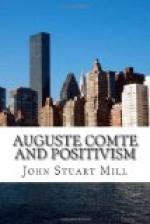concours,” in other words, a strike or a lock-out;
with the sacerdotal order for mediators in case of
need. But though wages are to be an affair of
free contract, their standard is not to be the competition
of the market, but the application of the products
in equitable proportion between the wants of the labourers
and the wants and dignity of the employer. As
it is one of M. Comte’s principles that a question
cannot be usefully proposed without an attempt at
a solution, he gives his ideas from the beginning as
to what the normal income of a labouring family should
be. They are on such a scale, that until some
great extension shall have taken place in the scientific
resources of mankind, it is no wonder he thinks it
necessary to limit as much as possible the number
of those who are to be supported by what is left of
the produce. In the first place the labourer’s
dwelling, which is to consist of seven rooms, is, with
all that it contains, to be his own property:
it is the only landed property he is allowed to possess,
but every family should be the absolute owner of all
things which are destined for its exclusive use.
Lodging being thus independently provided for, and
education and medical attendance being secured gratuitously
by the general arrangements of society, the pay of
the labourer is to consist of two portions, the one
monthly, and of fixed amount, the other weekly, and
proportioned to the produce of his labour. The
former M. Comte fixes at 100 francs (L4) for a month
of 28 days; being L52 a year: and the rate of
piece-work should be such as to make the other part
amount to an average of seven francs (5_s_.
6d.)
per working day.
Agreeably to M. Comte’s rule, that every public
functionary should appoint his successor, the capitalist
has unlimited power of transmitting his capital by
gift or bequest, after his own death or retirement.
In general it will be best bestowed entire upon one
person, unless the business will advantageously admit
of subdivision. He will naturally leave it to
one or more of his sons, if sufficiently qualified;
and rightly so, hereditary being, in M. Comte’s
opinion, preferable to acquired wealth, as being usually
more generously administered. But, merely as
his sons, they have no moral right to it. M.
Comte here recognizes another of the principles, on
which we believe that the constitution of regenerated
society will rest. He maintains (as others in
the present generation have done) that the father owes
nothing to his son, except a good education, and pecuniary
aid sufficient for an advantageous start in life:
that he is entitled, and may be morally bound, to
leave the bulk of his fortune to some other properly
selected person or persons, whom he judges likely
to make a more beneficial use of it. This is
the first of three important points, in which M. Comte’s
theory of the family, wrong as we deem it in its foundations,
is in advance of prevailing theories and existing
institutions. The second is the re-introduction




